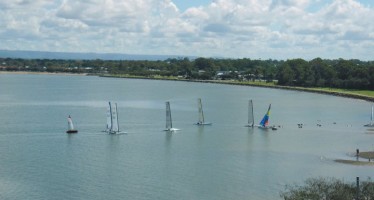21st Century “Kunta Kinte”! Chapter 3: The dream!

21st Century “Kunta Kinte”!
Introduction: Revealing the “untold”! | Chapter 1: The realisation! | Chapter 2 : The beginning!
Chapter 3: The dream!
I have just realised and questioned myself after reading my last episodes, am I portraying a life full of frustration! Am I talking against the life we are enjoying here in Australia? Am I discussing something which is a ‘tabu’ in a country built by migrants? Do I really have points in identifying the relationships between my life and the life of ‘slaves’ in the 17th century?
My life here in Australia is certainly not only full of frustration! There were, are and I know will be better time to remember. I will devote the next chapter to the positive events in Australia.
The publication of this article itself is a great event in my life in Australia. I never thought how much discussion and debate this article may generate within our small community. It is huge encouragement for me to continue sharing our life in Australia with the wider migrant communities. I agree, what I felt as a life of ‘slavery’, ‘a conspiracy theory’, may not be same for my fellow first generation migrants. I agree, each of us has different types of experience within our own lifestyle.
One of our friends after reading my experiences in Australia, raised a very strong questions about our ‘trapped life’. She is an academic with very high intellectual level. I respect her comments. Her point was that, aren’t we also trapped when we decide to become parents? Aren’t we trapped because of our own actions? Very valid questions!
Yes, we are sometime trapped due to our own actions. What other trap could be more ‘long-term’ than to become a parent! However, it is probably one of the best joy, I ever had in my whole life when I became the father of my child. To me, we should not see parenthood as a trap but a joy forever. Culturally we devote our whole life for the betterment of our children and we love doing it! We sacrifice at a highest level to gain better quality of life for our children. For us, children are our ‘jewel in the crown’.
I believe, developed countries have capitalised on this sentiment and emotion. Can you believe, being a migrant from Bangladesh, you would get ‘monitory incentive’ to have a baby? This is a fantastic policy to encourage citizens including migrants to have babies supported by ‘baby bonuses’. We get money to have babies as the decision makers in developed countries are very much aware about our sentiments for children and their wellbeing. Yes, my friend was probably right, we are trapped with children!
One of the many reasons, we are encouraged to fall into the trap because of the very cleverly designed social policy. We all know that it become very tough for us to think about anything else but the children once we are parents. It is very difficult for us to think about even going back to our country once we become parent. And that’s where I believe the ‘conspiracy theory’ to keep us in this country works!
In relation to these types of issues, I just wanted to raise few questions from my own experience.
Why do I have to show my Australia citizenship certificate and/or write the number on my citizenship certificate when dealing with any official activities (including job interviews) with Australian Government? Why don’t they accept my Australian Passport to prove my citizenship as an alternative?
Unfortunately, though the passport is a document superseded the citizenship certificate, still is not counted as an equivalent document like the citizenship certificate. I know it is an optional thing to have a passport but, my point is that if you have one, you should have the opportunity to use it as an alternative. Otherwise, like my daughter, who came to this country with us when she was 40 days old, need to carry the citizenship certificate for rest of her life!
Why would someone still differentiate between me, and people who were born in this country with a ‘fence’ of a certificate which was given to me 23 years ago! While I have, Australian passport, tax file number, employment track record to demonstrate my loyalty to this country?
I believe this a policy to identify the ‘slaves’ upfront!
Question two: Do you know that after 30-40 years of service, can you take bulk of your superannuation savings out of this country to invest anywhere in the world including Bangladesh? Unfortunately you can’t!
But migrants from countries like Greece, United Kingdom have reciprocal arrangements with Australian Government to take their super fund (what ever amount they need) back to their own countries whenever they are entitled to have it. As a ‘knowledge slave’, we can withdraw our entitled ‘pension’ overseas but still can not take the whole amount out of this country, even if I need to. To me this is another policy need to be reviewed. It is another question of equal rights!
Sorry for the long introduction. Let me go back to my original track by continuing my own experience again.
My last chapter concluded, when we commenced our dream of owning a house. This is the great ‘Australian Dream’!
In October 2007, Professor Barbara Norman and her associates released the publication Urban 45 by RMIT, where they have raised for the first time whether affordable housing is the great Australian nightmare rather than a dream.
We were very much dreaming about our own house as we were still in the 1990’s. Owning a home is another misconception or presented in such a way that you feel like you own a house but in reality you are trapped in a ‘planned’ liability for next 30 years of your life. This is another step into the ‘conspiracy’. The big banks are ready to lend you thousands of $ to buy your house and trap you for next 25-30 years at minimum.
In 1994-95, we had two contract jobs and by now we have around $14,000 savings in the bank. The bank said we were eligible to apply for a loan but with our household income and current interest rate of 11% (yes, it was 11% at that time) we won’t be able to borrow more than $150,000 to buy a property. In 1995, you could still buy a house for $150,000 very easily!
Finally in 1995, I got a permanent job with the Melbourne City Council. A permanent job, which offered me a salary of $36,000 per year plus superannuation, leave benefits, holidays. I was over the moon and Nigar was the first person to share the news. And she had some good news to share as well. She was pregnant again! Things started to look greener, brighter, better!
We now have Banks approval, savings and at least one permanent job. Very well groomed couple, ready for ‘sacrifice’. It provided a perfect combination to fall into the trap of so called home ownership.
We did not have to wait long to buy our first home. We bought a lovely three bedroom sub-urban house on a corner block with a lovely backyard in Templestowe for $135,000 by borrowing most of the money at an interest rate around 10% per annum. The repayment was around $1,000 per fortnight. We were truly trapped within the great Australian ‘trap’ to keep migrants here in Australia.
This was the ultimate ‘chain’ for migrant labours. Once you are in, very difficult to come out! For the first time my ‘poor’ mother in Bangladesh realised that she has lost her younger son forever in the bush of Australia!
I still remember her comments, “so you have bought a house now, does that mean you are not coming back to Bangladesh?” I did not have the true answer at that time but I probably knew the answer inside my heart. I wanted to tell her loud, “I am trapped mum, come and rescue me from this mess, like you have always done”. I couldn’t, as this was ‘slavery’ by choice for me!!
One income, mortgage and a new baby (our second daughter), that’s how we started our 1996 in Australia. Tough time! Mortgage repayments, bills, rates, car registration, car servicing, super market, social commitments, house maintenances, it can’t be of anymore complicated then this. We were frustrated again.
Some day we looked forward for diner invitation to our friend’s house so that we don’t have to buy food to save money. Some day we really did not have enough money to feed ourselves twice a day. Yes, we were very bad money managers and obviously very week in maths!
But the banks never told us about all these additional expenditure that we had to put up with as part of the home ownership trap. We never calculated expenses like council rates, utility bills, variation in interest rates etc. We were genuinely trapped!
God was our only hope. Ongoing praying to god on every occasion was my daily life ritual. Doesn’t matter where I am, I always prayed to God to rescue us from this mess. On my way to work in the bus, driving car to a friends house, cooking in the kitchen, watching TV, I remember praying to god for relieve!
Going back to Bangladesh or seeking financial help from families was shameful defeat to me. This is my ‘war’, I have to fight for it to win!!
I started to apply for jobs with a considerable higher salary with higher ranked position. I was confident to perform the responsibilities but not courageous enough to apply as I was discouraged by some of my ‘close’ friends.
Finally there was a break through!
A State Government department in Victoria offered me a senior position with a salary of $50,000 per annum.
The bus wasn’t travelling fast enough on that day, the radio was not plying the right songs, the sun wasn’t strong enough to complement my happiness. I wanted to go home as soon as possible to share the news with Nigar, who was suffering from a tremendous post-natal depression.
I remember, after giving birth to our second daughter, Nigar was in the midst of a dilemma with all these commitments and responsibilities with very little money. She wasn’t well enough to go back to work! She was very depressed for not being able to contribute in such a critical time. We were not in a position to send the baby to a child care, which was again expensive for us.
She went to a deep depression which was witnessed only by me and sometime felt by our 7 years old daughter Kishoree. Every night we shared our tears. We regretted our actions so many times, blamed each other thousand times, cursed the banks millions times.
But every bad feeling was superseded by the ‘billion dollars’ worth of love and affection we shared between each other and our two daughters. Our strong believe in God, who I still believe works in mysterious ways and our love gave us the strength to come out of this depression. And we did!
However, I stepped into a new trap with a new job but still contemplating the consequences of going back to Bangladesh. As I have realised by this time it will be hard for us to sustain in this environment. But I couldn’t forward the agenda as I was trapped again with more ‘luxury’ packages to suit my requirements. Some unknown force was working behind me to ensure, I can’t even think of returning to the developing world. I was more or less ‘brain washed’
I still believe every migrant comes to this country has an unwritten hidden ‘case manager’ working behind the scene. Assisting this great conspiracy to succeed. He/she tracks them, advice them directly/indirectly, mentor them and follow them around to ensure they can’t leave this country alive!
We all are case managed ‘subjects’. I am still searching for my case manager!!
(to be continued in April)
Related Articles
কমফোর্ট জোন
গুগুল ট্রান্সলেটর বলছে কমফোর্ট জোন মানে হচ্ছে সুবিধাজনক স্থান। তারমানে সোজা কোথায় বললে নিজের অনুকূল পরিবেশ। অনুকূল পরিবেশ অনেকভাবেই হতে
Probashe Oboshar
প্রবাসে অবসর…… আমার অনেক প্রিয় ব্রিজবেন বীচ, পানির মাঝে মনে হয় হীরার টুকরো ছড়ানো……… সময় যেন কাটেনা, বড় একা একা
মেলবোর্নে নতুন করোনায় ভীতসন্ত্রস্ত মুসলিম নেতারা
ফজলুল বারী: করোনা ভীতিতে শুধু সামাজিক পারিবারিক নয়, দেশে দেশের সম্পর্কও নতুন চেহারা নিচ্ছে! যেমন জাপান সহ কয়েকটি দেশে এখনই






